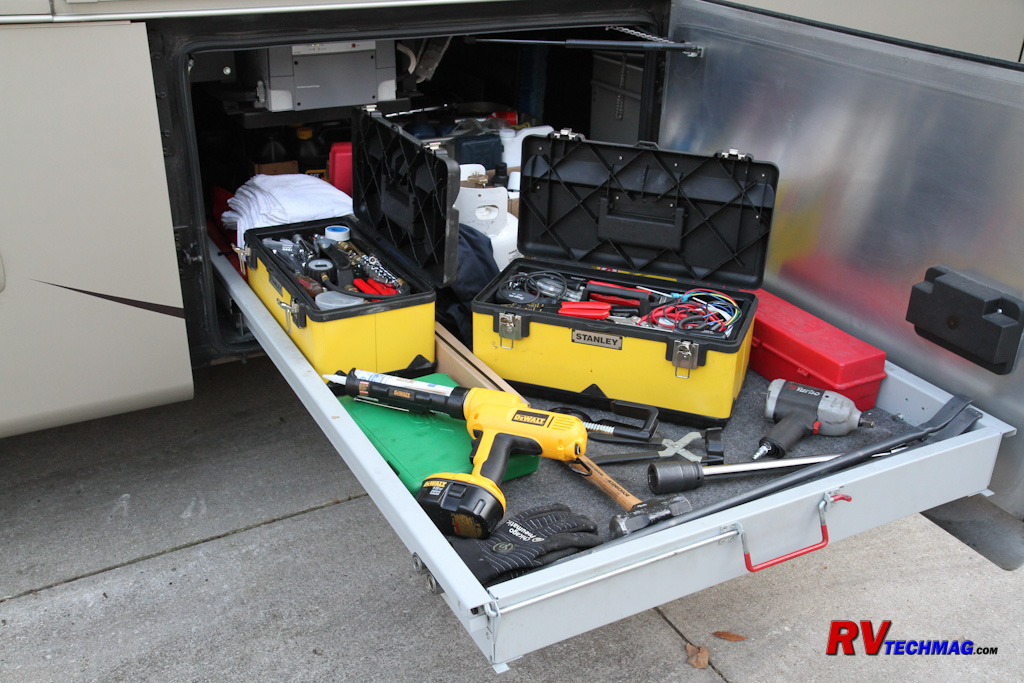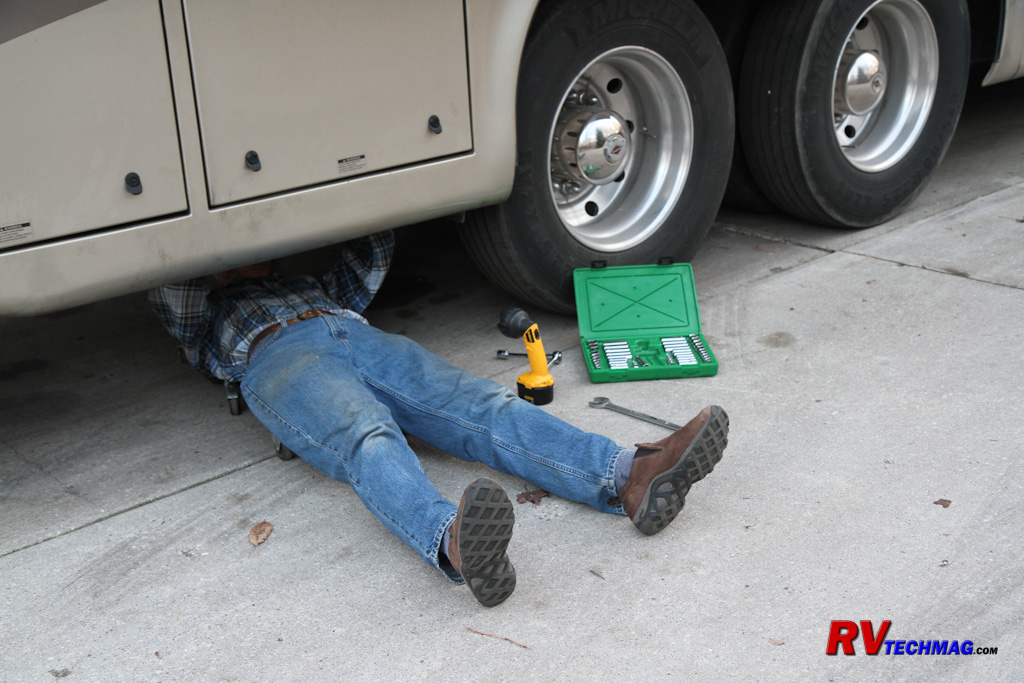Tools You Can't Live Without
Highway Tales
Article Date: March, 2015
Article and Photography by Mark Quasius

Okay, it's a fact of life that women like to have lots of shoes. Guys - not so much. We have our own fetish, collecting
tools. You know, that tool that you absolutely have to have because without it the space-time continuum would be irreparably damaged and the earth
would spin off towards the sun. But, with the right tool we can fix anything, including planets bent on destruction.
Guys need tools. Even if they don't know how to use them, they need to be there. If nothing else because it affects Murphy's
Law, which states that the item that breaks will always be the one that you don't have a tool for. If you have that tool you may never have to use
it but it will ward off those RV gremlins that seem to always appear. Then again, sometimes you actually can use those tools, which is why most RV
owners like to carry about twice as many as their RV's cargo carrying capacity is rated for.
Naturally, anything with "power" is best. Power tools give us authority and manliness. Cordless power tools are perfect for
RV owners because you can use them anywhere as long as their batteries are charged, which of course they never are. Cordless tools have come a long
way and there seems to be a conspiracy amongst cordless tool manufacturers to constantly improve them with more power. After all, it's just not cool
to have a 12 volt cordless drill when any real toolguy wouldn't be seen with anything less than an 18 volt drill. Never mind that you could probably
do the job with a 9.6 volt tool just as well or the fact that it will probably spend more time in your basement compartment than actually being used.
Occasionally though, there are some tools that can be a real lifesaver. Most RVers have a socket set, wrenches, screwdrivers,
a multimeter and other basic hand tools but there's those extra tools that can really make the difference. In some cases it speeds the job and saves
effort and in some cases you just plain need it or you aren't going to be able to do that job. I can think of a number of tools that I own that fit
that category.
First off, no one should ever leave home without a big hammer. I don't mean a 16 oz claw or ball peen hammer. When I first
got a job as a diesel mechanic my service manager saw me looking at hammers at a hardware store and handed me a 4 lb. sledgehammer with a 16" handle.
He told me that was the one I wanted and to forget about the smaller ball peen hammers. You can always hit lightly with a big hammer but you can't hit
hard with a light hammer. That was good advice and I now have a number of "war clubs" that are always close at hand wherever I am and has saved my
buns a number of times.

Another handy item I've acquired is a Sunex 38 piece mini ratchet and bit set that features a super compact ratchet that
holds small hex screwdriver bits. They have gotten me in and out of tight spots that even a stubby screwdriver is just too tall for. The selection
includes hex key and Torx bits as well as every other bit that you could imagine. With this, plus my Snap-On interchangeable bit ratcheting screwdriver
I'm virtually unstoppable. If those two tools can't get the screws out there's always that four pound hammer and a chisel.
Another great item is a good torque multiplier. The lug nuts get torqued to 475 ft-lbs and it takes more than that to break
them free once they've been on for a while. Applying all of my weight to a socket with a 5' long bar only results in my feet coming up off the ground.
With a 6:1 torque multiplier I can easily remove them with my 1/2" drive breaker bar. It also lets me use my 1/4" drive torque wrench to comfortably
torque them back up to 475 ft-lbs.
Caulking is a big issue on most RVs. The sun and weather attacks this stuff that's oh so gooey when it's first applied but
after its been on a while turns into a crumbling mummified deposit that invites water to seep into your RV. Recaulking roofs, vents, and windows is
just part of the fun of owning an RV but it gets a whole lot easier if you have a cordless caulking gun. My DeWalt 18 volt cordless caulking gun
eliminates that constant squeeze and release trigger action common to manual caulking guns. It has a variable feed rate and it backs off when you
release the trigger to prevent dribbling. The end result is that you get a more consistent bead and your hand doesn't feel like it's ready for Carpal
Tunnel surgery when you are done. Plus the batteries interchange with all my other 18 volt DeWalt tools.
Hydrometers are used to test the specific gravity of your coolant or battery acid so that you can determine the freeze point
of your coolant and the state of charge of your battery cells. But you need two separate hydrometers to do this and they are made of glass so they
break easily. Hauling then around in a bouncing RV isn't going to guarantee they'll arrive intact. A refractometer is a much better choice because
it's a small compact instrument that travels well and works on both antifreeze and battery acid. Besides you look more like Mister Wizard when you
use it so you always want to bring it out when you have an audience for the best effect.
And last, but not least. You'll need to look the part. Wearing a ball cap with a Snap-On Tools logo will identify you as a
serious professional.
Return to Home Page
If you enjoyed this article be sure to recommend RVtechMag.com to your friends, like us on Facebook or Twitter
or subscribe to our RSS feed.



|






